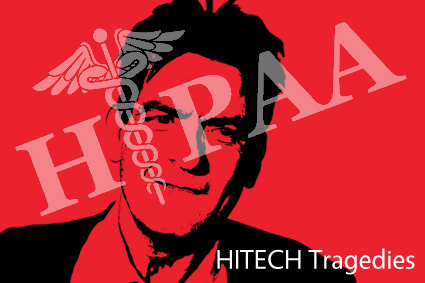I actually feel sorry for Charlie Sheen. I’m sure Charlie has his character flaws along with excessive fame. I am also certain he is entitled to his medical privacy. When you consider, people in his private circle blackmailed him. Most would agree he is a living tragedy. For all the fun, he has no trust or privacy. His medicine cabinet is an open door. Just ask the Internet or turn something on. It’s more, like empathy.
Although his HIV positive outing wasn’t a healthcare breach, let’s hope. His friends signed non-disclosures. HIPAA HITECH laws would apply. He, like everyone else, should be concerned. We’re all targets after all. According to TrendMicro‘s report, identity theft is rampant in the healthcare industry. Healthcare accounts for almost 30% of the fraud victims across industries for ten years running. The next highest industries, Retail and Government, are half as much. Compounding the problem, the causes are shifting too. Ahead of employee negligence and lost equipment, criminal attacks are now the number one cause.
Similar to Charlie, prevention is as key to information privacy as it is to health. Yet, it seems routinely healthcare companies are breached. The 2015 Experian Data Breach Forecast reports. 91% of all healthcare organizations experienced at least one data breach over the last two years. Since inadequately equipped healthcare organizations secure significant amounts of sensitive information, they are an attractive target. Many doctors’ offices, clinics and hospitals lack adequate patient information safeguards. Compared to other sectors, their systems lack access controls and their system users demonstrate less security awareness.
HIPAA HITECH Identity Management Controls
More than HIPAA HITECH compliance, IT organizations require identity and access management security controls. Healthcare IT faces dual pressure from HIPAA HITECH reporting and ongoing breach risks. To prevent cyber criminals, the solution lies in built-in user access management protocols and approval workflow. IT automation of identity management operations adds protection over patient health information (PHI). By automating new hire provisioning, transfers, and terminations, it removes human error and latency from processes. It also ensures accountability, governance and IT audit reporting.
Identity management, access management, and enterprise password management solutions provide security and compliance reporting. They simplify both HIPAA reviews while elevating security to better ensure patient privacy. Identity and access management prevention controls keep you prepared and able to ensure privileges are granted and terminated according to corporate policies and regulations.
HIPAA HITECH Identity Management Framework
Identity management delivers a unified framework for HIPAA HITECH compliance. To manage employees, contractors, clinics, and partners user access, an identity manager automates the following HIPAA access controls:
164.308(a)(1)(i) Security violation policy and procedure automation.
164.308(a)(1)(ii)(C) Security for individuals and groups.
164.308(a)(1)(ii)(D) System activity log aggregations.
164.308(a)(2) Policies and procedures for approval workflow.
164.308(a)(3)(i) Approval process for PHI access requests.
164.308(a)(3)(ii)(A) Access management and access controls.
164.308(a)(3)(ii)(C) User account access terminations.
164.308(a)(4)(i) Authorization and access controls to systems.
164.308(a)(4)(ii)(B) Security for access to systems.
164.308(a)(4)(ii)(C) Security for granting access to PHI systems.
164.308(a)(5) Security updates on sign-on screen.
164.308(a)(5)(ii)(D) Enterprise password management.
164.308(a)(6)(i) Detection, reporting and incident response.
164.308(a)(7)(ii)(E) Identity management asset management controls.
164.308(a)(8) Compliance assessment and security evaluations.
164.310(a)(1) Access to systems and facilities.
164.310(a)(2)(ii) Server, equipment and smart card access.
164.310(a)(2)(iii) Card reader, biometric, badge and token authentication.
164.310(c) Physical safeguards for workstation access.
164.312(a)(1) Access management self-service administration.
164.312(a)(2)(i) Identity, password and group management.
164.312(b) Audit log aggregation, analysis and security reports.
164.312(c)(1) Alerts of suspicious and unauthorized activities.
As Charlie Sheen represents, medical records are a matter of personal privacy and trust. Healthcare providers must invest in patient information protection, keep pace with security threats, and get in line with other industries. Currently, half of all healthcare organizations express little or no confidence in their ability to detect patient data theft. That’s unacceptable. Access security controls protect a patient’s privacy. They fulfill HIPAA security requirements and make IT audit reporting efficient. Such systems can be up and running within weeks.
With healthcare breaches increasing, delivering on security protects patients while improving the efficiency and utility of HIPAA HITECH reviews. Healthcare IT must modernize these systems. Security stems from keeping malicious users out, restricting user access, and monitoring. All three of these principles are exponentially improved through identity management, which enables IT staff to focus on other security threats.
Get the Top 10 Identity Manager Migration Best Practices Workbook
 Start your migration from legacy software with the Top 10 Identity Manager Migration Best Practices Workbook. Use this workbook to think through your information security risk before you transition to next generation identity manager software.
Start your migration from legacy software with the Top 10 Identity Manager Migration Best Practices Workbook. Use this workbook to think through your information security risk before you transition to next generation identity manager software.




